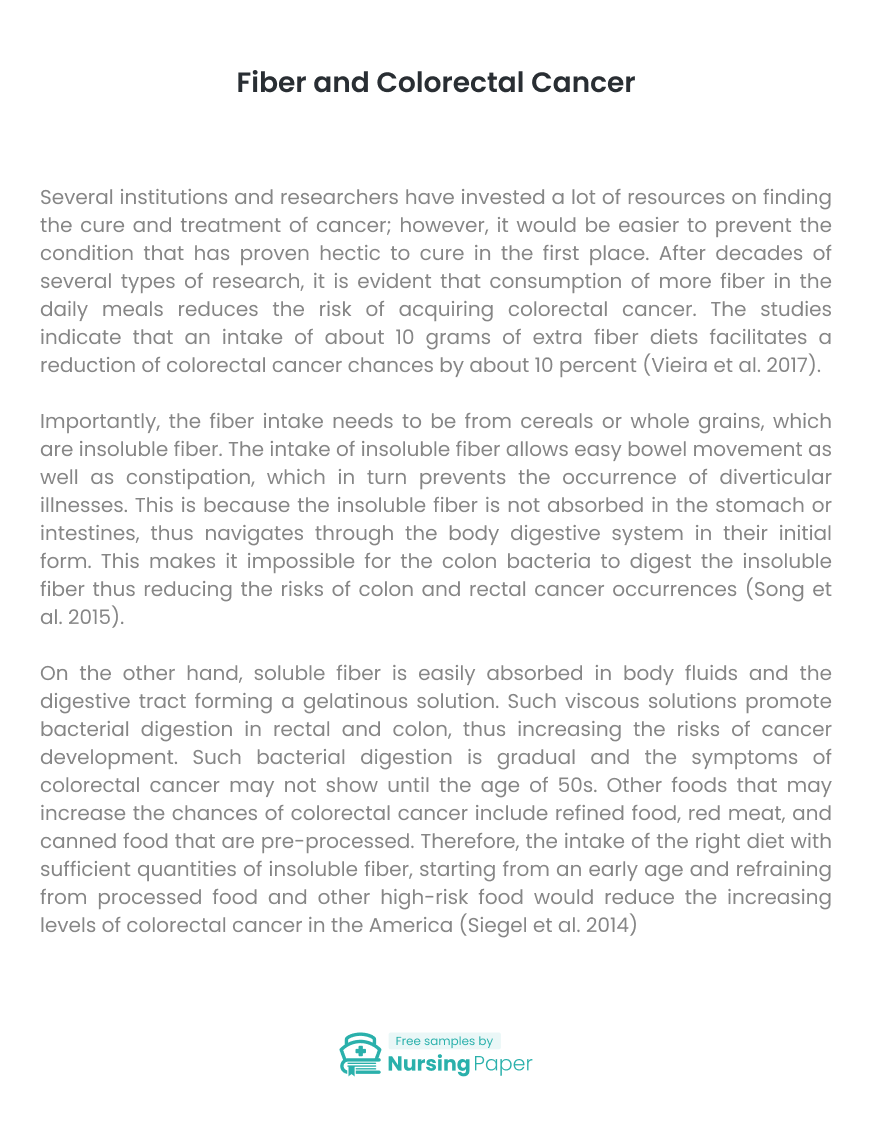
Fiber and Colorectal Cancer
Introduction
Several institutions and researchers have invested a lot of resources on finding the cure and treatment of cancer; however, it would be easier to prevent the condition that has proven hectic to cure in the first place. After decades of several types of research, it is evident that consumption of more fiber in the daily meals reduces the risk of acquiring colorectal cancer. The studies indicate that an intake of about 10 grams of extra fiber diets facilitates a reduction of colorectal cancer chances by about 10 percent (Vieira et al. 2017).
Importantly, the fiber intake needs to be from cereals or whole grains, which are insoluble fiber. The intake of insoluble fiber allows easy bowel movement as well as constipation, which in turn prevents the occurrence of diverticular illnesses. This is because the insoluble fiber is not absorbed in the stomach or intestines, thus navigates through the body digestive system in their initial form. This makes it impossible for the colon bacteria to digest the insoluble fiber thus reducing the risks of colon and rectal cancer occurrences (Song et al. 2015).


On the other hand, soluble fiber is easily absorbed in body fluids and the digestive tract forming a gelatinous solution. Such viscous solutions promote bacterial digestion in rectal and colon, thus increasing the risks of cancer development. Such bacterial digestion is gradual and the symptoms of colorectal cancer may not show until the age of 50s. Other foods that may increase the chances of colorectal cancer include refined food, red meat, and canned food that are pre-processed. Therefore, the intake of the right diet with sufficient quantities of insoluble fiber, starting from an early age and refraining from processed food and other high-risk food would reduce the increasing levels of colorectal cancer in the America (Siegel et al. 2014)
1. Siegel, R., DeSantis, C., & Jemal, A. (2014). Colorectal cancer statistics, 2014. CA: a cancer journal for clinicians, 64(2), 104-117.
2. Song, Y., Liu, M., Yang, F. G., Cui, L. H., Lu, X. Y., & Chen, C. (2015). Dietary fiber and the risk of colorectal cancer: a case-control study. Asian Pac J Cancer Prev, 16(9), 3747- 3752.
3. Vieira, A. R., Abar, L., Chan, D. S. M., Vingeliene, S., Polemiti, E., Stevens, C., … & Norat, T. (2017). Foods and beverages and colorectal cancer risk: a systematic review and meta-analysis of cohort studies, an update of the evidence of the WCRF-AICR Continuous Update Project. Annals of Oncology, 28(8), 1788-1802.



The download will start shortly.

The download will start shortly.
 Subject:
Health and Social Care
Subject:
Health and Social Care  Number of pages: 7
Number of pages: 7  Subject:
Nursing
Subject:
Nursing  Number of pages: 3
Number of pages: 3  Subject:
Medicine
Subject:
Medicine  Number of pages: 7
Number of pages: 7  Subject:
Medicine
Subject:
Medicine  Number of pages: 5
Number of pages: 5  Subject:
Nursing
Subject:
Nursing  Number of pages: 3
Number of pages: 3  Subject:
Medicine
Subject:
Medicine  Number of pages: 7
Number of pages: 7  Subject:
Health and Social Care
Subject:
Health and Social Care  Number of pages: 7
Number of pages: 7  Subject:
Medicine
Subject:
Medicine  Number of pages: 2
Number of pages: 2  Subject:
Nursing
Subject:
Nursing  Number of pages: 7
Number of pages: 7  Subject:
Medicine
Subject:
Medicine  Number of pages: 3
Number of pages: 3  Subject:
Medicine
Subject:
Medicine  Number of pages: 3
Number of pages: 3  Subject:
Medicine
Subject:
Medicine  Number of pages: 6
Number of pages: 6  Subject:
Medicine
Subject:
Medicine  Number of pages: 4
Number of pages: 4  Subject:
Health and Social Care
Subject:
Health and Social Care  Number of pages: 5
Number of pages: 5  Subject:
Medicine
Subject:
Medicine  Number of pages: 5
Number of pages: 5 
